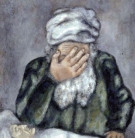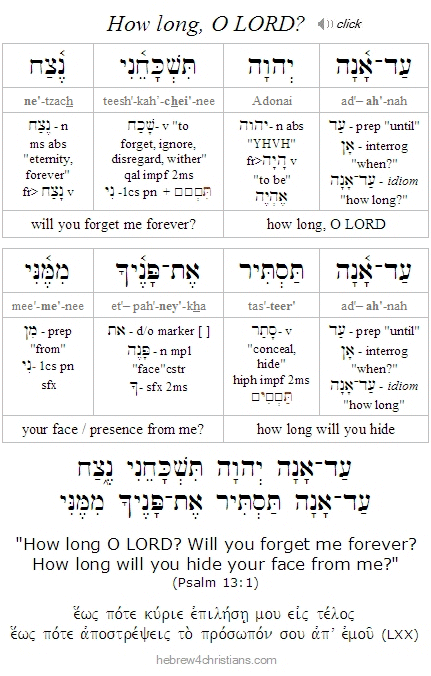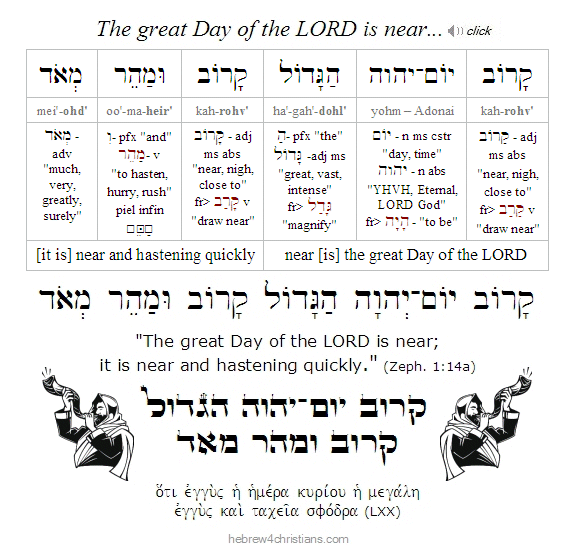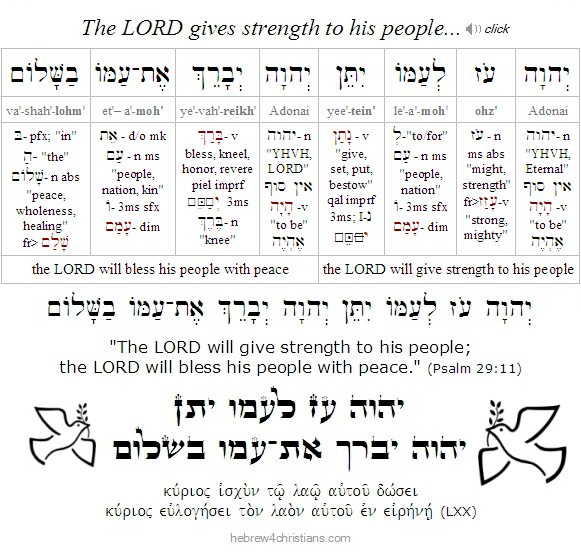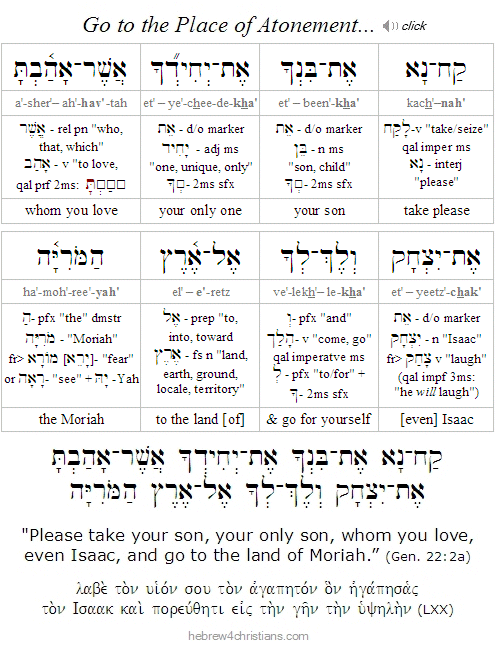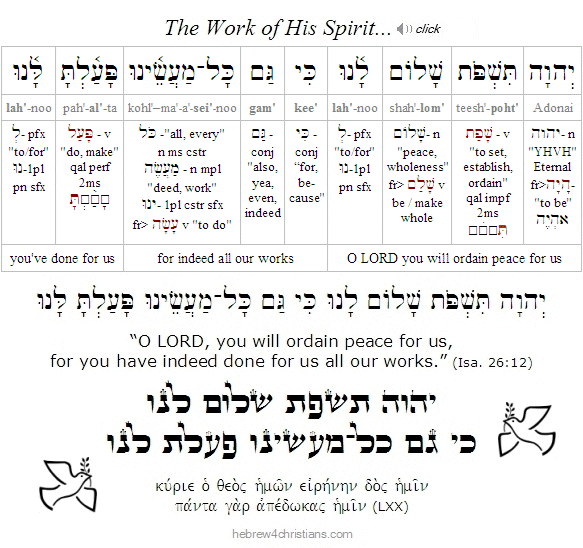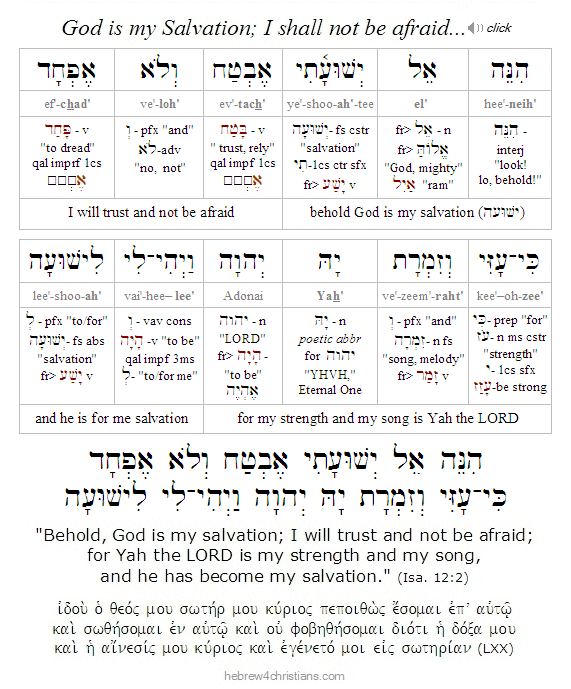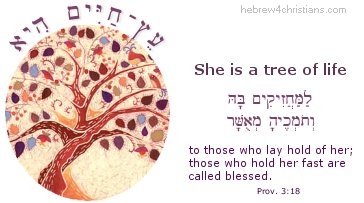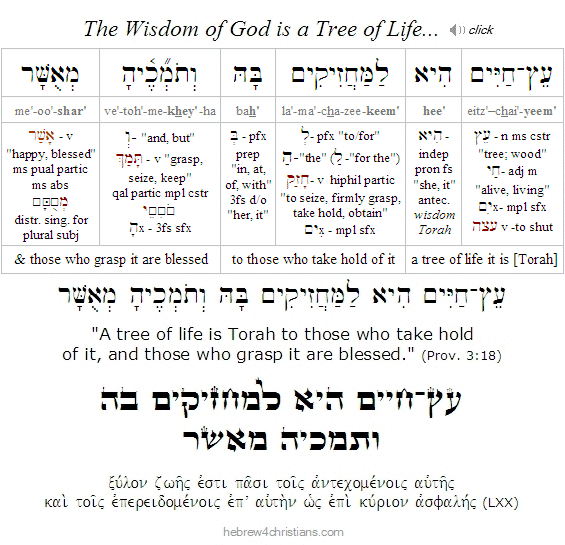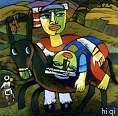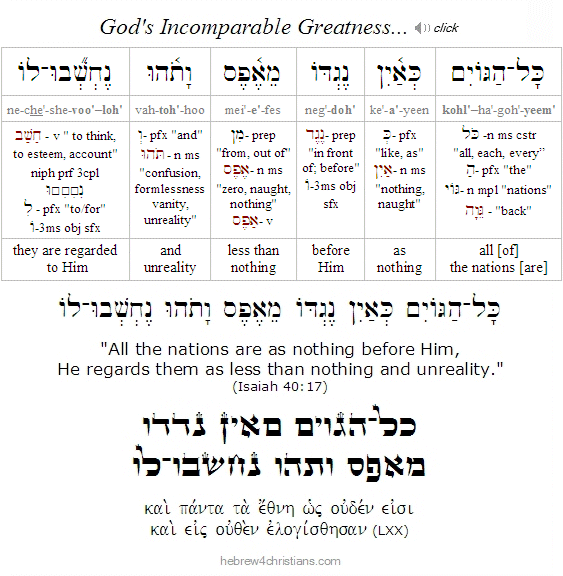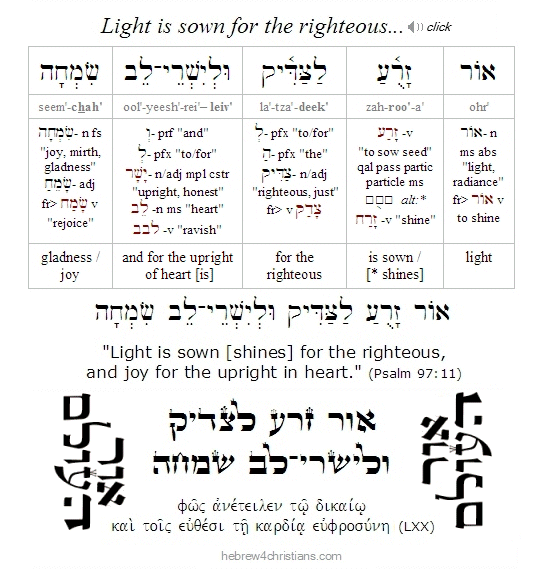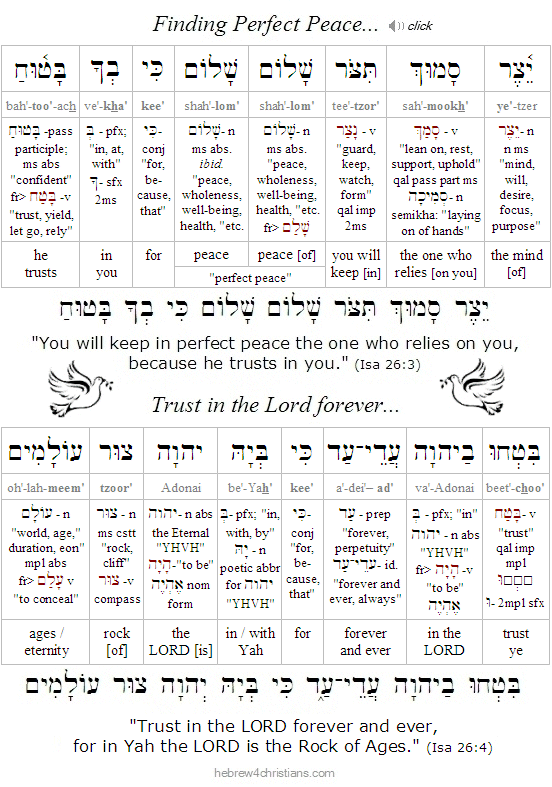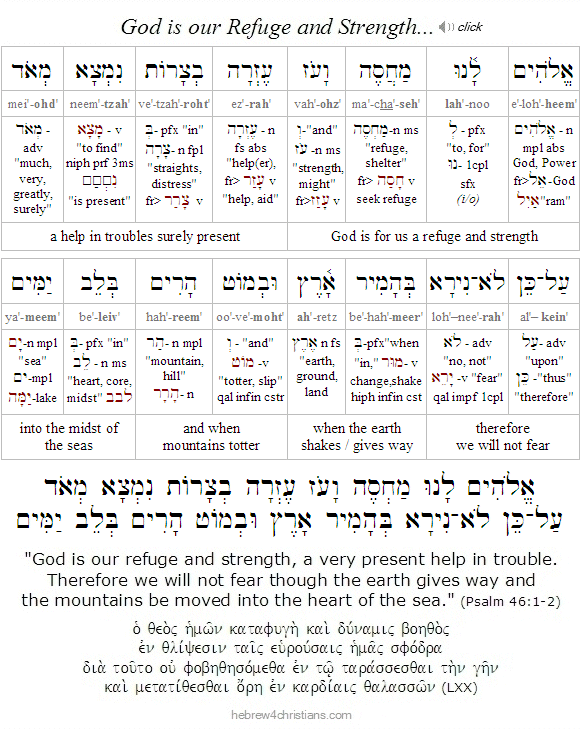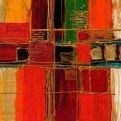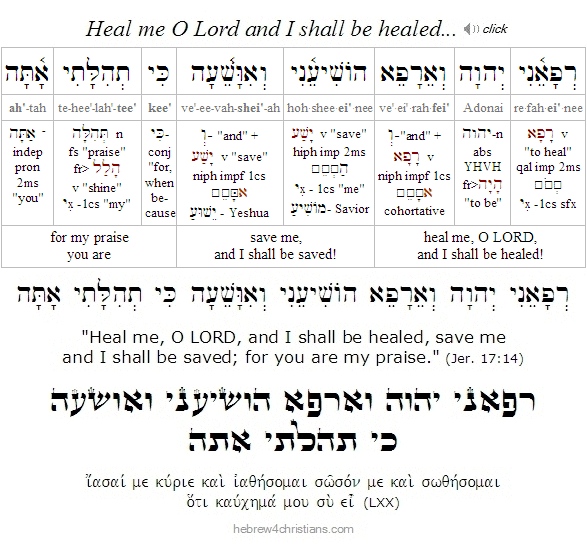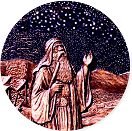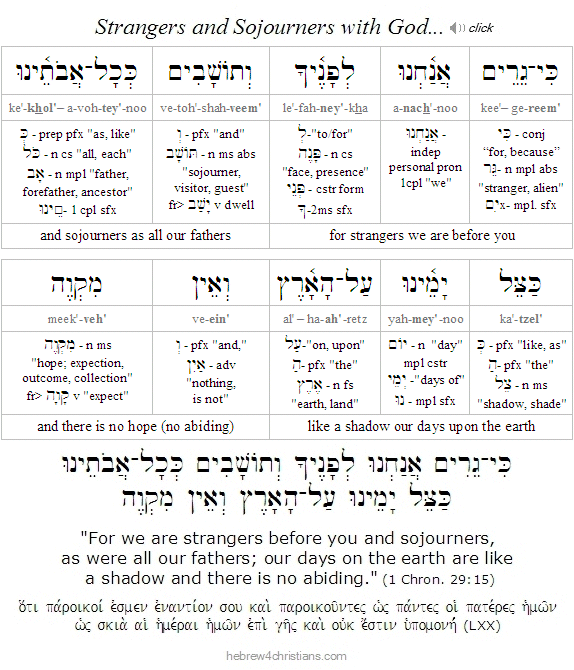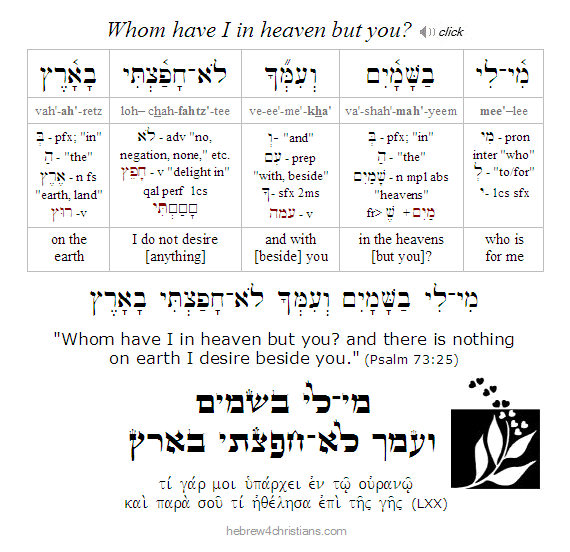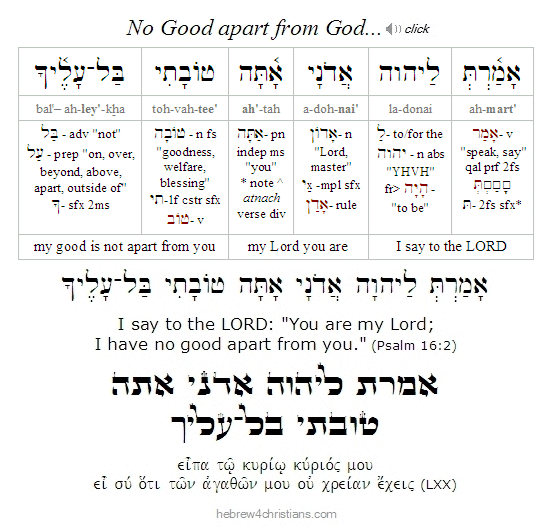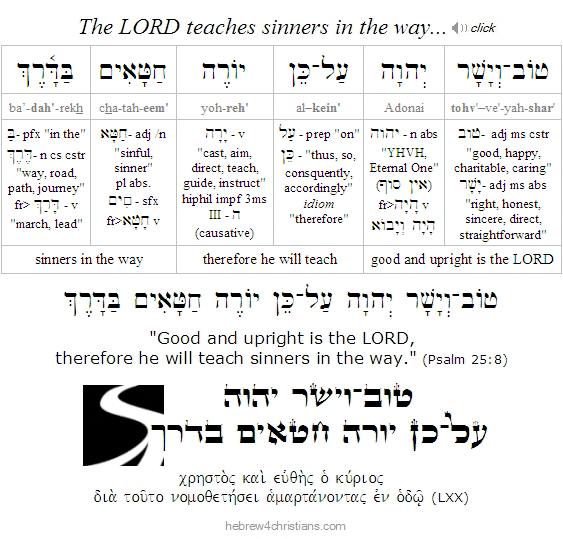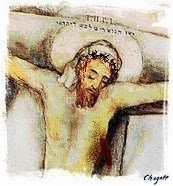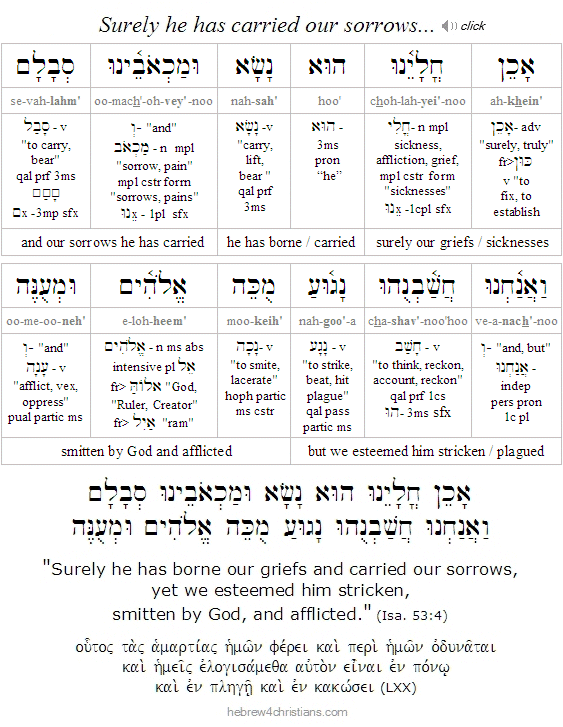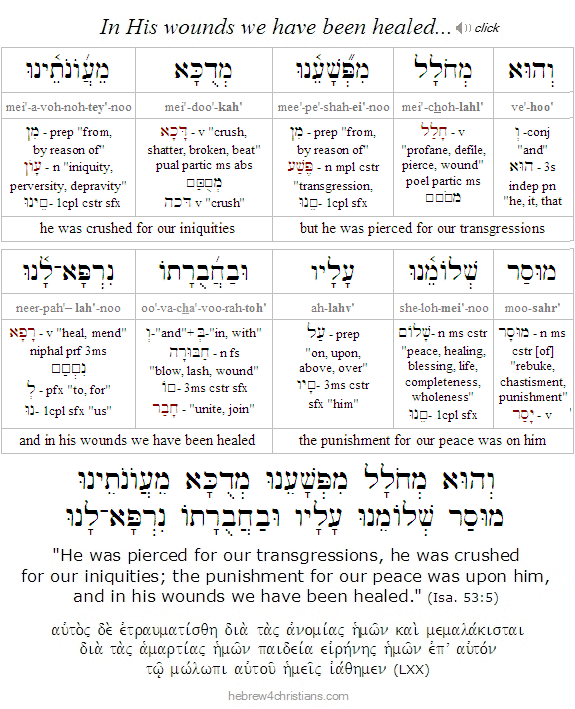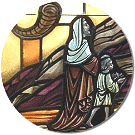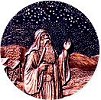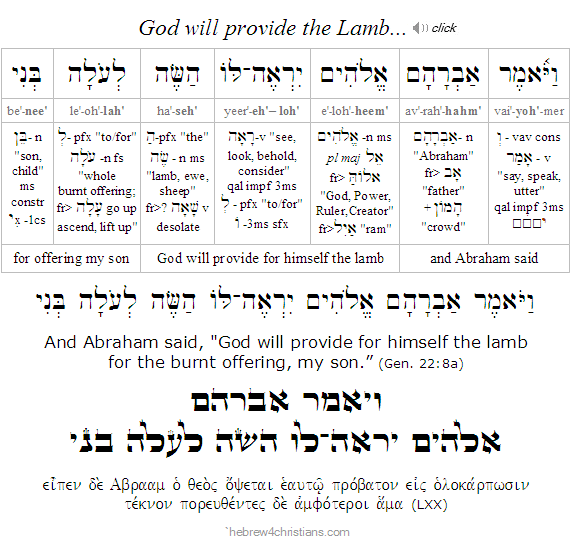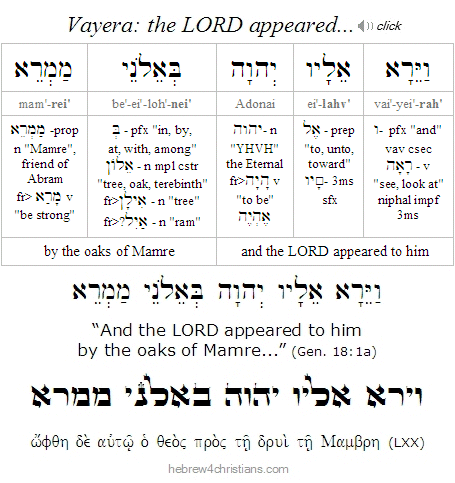|
|
|||||||||||||||||||||
 |
|||||||||||||||||||||
|
Learn Hebrew |
|||||||||||||||||||||
 |
|||||||||||||||||||||
|
Learn Torah |
|||||||||||||||||||||
|
November 2020 Updates (continued)
11.06.20 (Cheshvan 19, 5781) The Scriptures are filled with desperate cries of the heart... "How long, O LORD? Will you forget me forever? How long will you hide your face from me? How long must I take counsel in my soul and have sorrow in my heart all the day?" (Psalm 13:1-2). "Make haste to help me, O LORD, my salvation!" (Psalm 38:22). "My soul melts away from grief; strengthen me according to your word" (Psalm 119:28). "Answer me quickly, O LORD! My spirit fails! Hide not your face from me, lest I be like those who go down to the pit" (Psalm 143:7). God know that "hope deferred makes the heart sick" (Prov. 13:12), so there can be no turning to God, no teshuvah, apart from the presence of real hope (תִּקְוָה). Indeed, as the Apostle Paul wrote: "We are saved by hope" (Rom. 8:24). "Whenever you find tears in your eyes, especially unexpected tears, it is well to pay the closest attention. God is speaking to you through them of the mystery of where you have come from and is summoning you to where you should go to next. (Frederick Buechner, Whistling in the Dark: 1988).
11.06.20 (Cheshvan 19, 5781) Since our political age is marked more than ever by deceptive syncretism and "politically (in)correct" forms of coercion (i.e., socialized violence), we must understand and value the life of the authentic individual, that is, the person of faith who is marked by moral courage and integrity that transcends the indoctrination and stupor inculcated by mass media and its relentless propaganda.... It is as common as a coin of the realm to see the schemes of various "change agents" fabricating problems in order to move the social order according their agendas. Indeed this is the age of engineered terror, the antithesis of which is not some nebulous "freedom" as suggested from the princes of this world, but rather a new form of slavery unlike anything before seen on this earth. It behooves us not to look to the usual suspects -- and never to forget the role of the crowd in Nazi Germany... In light of all this, we must be be careful not to cling to this world or be "disheartened when the desolation of the wicked comes" (1 John 2:15; Prov. 3:25). The kingdom of man is at war with the kingdom of God, and whoever wishes to be a "friend" of this evil world makes himself an enemy of God (James 4:4). Regarding this doomed world the LORD speaks thus to His children: "Come out of the midst of her and be ye separate, lest you take part in her sins, lest you share in her plagues." This call to be separate may be more difficult for those who live in the midst of present-day "Babylon" than in other places of the world, because in Babylon it is far too easy to coddle the flesh and to avoid taking a costly stand for the truth... However, the reign of Babylon is spreading like a cancer throughout the world, consolidating power, and soon it will demand complete allegiance of all who dwell upon the earth. During that time of tribulation, all the peoples of the world will be forced to chose whether to accept the "mark of the beast" (i.e., citizenship in world order) or to face persecution, etc. We must not fear man or his devices, for the LORD will protect and strengthen His people.
[ The following entry is related to this week's Torah reading, parashat Lekh-Lekha.... ]
11.06.20 (Cheshvan 19, 5781) Yeshua said: "I am the vine; you are the branches. Whoever lives in me and I in him, he it is that bears much fruit, for apart from me you can do nothing" (John 15:5). We cannot create the new birth by means of moral reformation, since the divine life is a miracle from above and not the result of human agency or aspiration (John 1:13; John 3:6). If we "live in" Yeshua we will bear fruit - our spiritual connection or "union" with him is sufficient for every good work, but only fruit that derives from the life of Messiah will abide (1 John 2:17). Good works are a necessary consequence of regeneration in Messiah, but by themselves they are insufficient and something more is needed (Matt. 7:21-23). Therefore the Scriptures point to the salvation of God and his grace as the efficient cause for the miracle of newness of life: "Not by works of righteousness which we have done, but according to his mercy he saved us..." (Titus 3:5); "for by grace are you saved through faith, and that not of yourselves (τοῦτο οὐκ ἐξ ὑμῶν), it is the gift of God" (Eph. 2:8); "so if it is by grace, it is no longer on the basis of works; otherwise grace would no longer be grace" (Rom. 11:6). יהוה תשׁפת שׁלום לנו Adonai · teesh·poht · sha·lom · la'·noo "O LORD, you will ordain peace for us, Hebrew Lesson:
11.05.20 (Cheshvan 18, 5781) "Because you are his children, God has sent the Spirit of his Son into your hearts, crying, "Abba! Father!" (Gal. 4:6). Note here the Spirit does not cry out using "esoteric" or abstruse names for God, nor does the Spirit refer to one of God's many titles based on the divine attributes, but instead uses a term of intimacy and profound trust. After all, the word "abba" (אַבָּא) is not so much a name for God as it is a claim about who you are -- it is a confession that you belong to the Lord as his beloved child... It has been noted that throughout his ministry Yeshua referred to the LORD simply as his "Father" though he used the intensive address "Abba, Father" (Ἀββᾶ, ὁ πατήρ) just before his arrest and crucifixion, that is, during his intercession at Gethsamane (גַּת שְׁמָנִים), near the olive oil press on the Mount of Olives where the anointing oil for the Temple (שֶׁמֶן הַמִּשְׁחָה) was made, and therefore he called upon "Abba, Father" while in deep suffering and tribulation of heart (Mark 14:36). "Take this cup away from me. Yet not what I will, but what you will..." The mixed dialect of Hebrew and Greek here (i.e., Ἀββᾶ, ὁ πατήρ) may indicate identification with both the Jewish people and the Gentiles who would be united in his passion, as it says, shalom shalom la'rachok vela'karov: "Peace, peace, to him who is far off and to him who is near," says the LORD; "and I will heal him" (Isa. 57:19, Eph. 2:15). Knowing God as your "father" is a matter of the heart, an inner cry or groan coming from the miracle of spiritual rebirth. "The Spirit himself bears witness to our spirit that we are God's children" (Rom. 8:16).
[ The following entry is related to this week's Torah reading, parashat Lekh-Lekha.... ]
11.05.20 (Cheshvan 18, 5781) There is a "transposition" of values, a "holy irony," in the realm of the Spirit. From God's perspective that which considered great in the eyes of men is considered of little account, and that which is considered insignificant in the eyes of men is considered of great importance (Luke 9:48). The wisdom of this world (i.e., pragmatic, self-promoting egotism, etc.) is regarded as folly before God (1 Cor. 1:20, 3:19). Therefore Yeshua "made himself nothing" and disguised himself in the form of a lowly servant (ἀλλὰ ἑαυτὸν ἐκένωσεν μορφὴν δούλου λαβών). Unlike various systems of religion that attach merit and status to those who have attained "respectable levels" of personal sanctity, those who are called "great" in the Kingdom of Heaven will be identified as the servants of all (Mark 9:35; 10:44). Like the hidden light of the menorah within the inner chamber of the Tabernacle, the deeds of the humble are beheld inwardly, where the Heavenly Father "sees in secret" (Matt. 6:4). As Yeshua Himself said, כִּי מַלְכוּת הָאֱלהִים בְּקִרְבְּכֶם / "The Kingdom of God is a matter of your inmost heart" (Luke 17:21).
"Blessed are those who weep while the world goes on laughing, for theirs is the kingdom of heaven; blessed are the meek, for they shall overcome; blessed are those who realize they know little, for they shall find treasure; blessed are those who realize they are unrighteous, for they shall find healing; blessed are the misfits who are disowned by the world as fools, for they shall find mansions in heaven; blessed are the weak, for they shall be made strong; blessed are those who weep, for they shall obtain eternal consolation; blessed are those who refuse to assimilate into this world and its idols, for they shall be called victors in the world to come..."
11.04.20 (Cheshvan 17, 5781) As followers of Yeshua, we no longer find our identity in this world but rather through our spiritual union with our ascended LORD (Gal. 2:20; 6:14; Eph. 1:3; 2:6)... As our Lord said, "If anyone would come after me, let him deny himself and take up his cross daily and follow me. For whosoever will save his life shall lose it: but whosoever will lose his life for my sake, the same shall save it. For what is a man advantaged, if he gain the whole world, and lose himself, or be cast away?" (Luke 9:23-25). Therefore we are instructed to "seek the things that are above (τὰ ἄνω ζητεῖτε) where the Messiah is seated at the right hand of God," and focus our thoughts on the things above - not on things here on earth - for we have died, and our lives have been hidden (κέκρυπται) with Messiah in God. Then when the Messiah, who is our life, appears, we too will appear with him in glory" (Col. 3:1-4). It is a spiritual decision to "seek first the kingdom of God" (Matt. 6:33), which means that we attach ourselves to God, esteeming the unseen and the eternal as more real than the seen and the temporal (2 Cor. 4:18). Turn away therefore from worldly news and gossip; these ephemeral affairs are empty, vain, and devoid of ultimate significance. Redirect your thoughts toward heaven. Understand that you belong to God and that your true home is in the world to come. Affirm this truth over and over until it becomes a part of your daily soul... Put away the "old nature" – all those labels and judgments the vain world system (העולם השקרי) uses to define you - and open your heart to the true radiance and peace of God instead (Col. 3:15). As it is written: "You will keep in perfect peace (i.e., שלום שלום, "the peace of peace") the one who leans on you, because he trusts in you. Trust in the LORD forever and ever, for in Yah the LORD (יה יהוה) is the Rock of Ages" (Isa. 26:3-4).
Hebrew Lesson: Isaiah 26:3-4 Hebrew Reading (click):
11.03.20 (Cheshvan 16, 5781) The Scriptures admonish us to pray for all who are in authority so that we may lead a peaceful and quiet life, godly and dignified in every way (1 Tim. 2:2). Unlike the world that uses violence to express its will, the weapons of our warfare are not "carnal" (i.e., based on human agency) but are "mighty through God" through the pulling down of strongholds of evil that seek to enslave people in darkness and fear (2 Cor. 10:5). Above all this is a spiritual battle, friends - a fight for the heart and soul of humanity. Ask for the Lord to intervene and thwart the schemes of the wicked who collude among themselves to "deconstruct" (i.e., deny) their responsibility to live and love the truth. The hour is now, and it is on our watch that the battle lines have come. Ruth Graham was reported to have said that if God did not judge America, he would have to apologize to Sodom and Gomorrah. Pray for our country, that the Lord will not consign this nation to judgment. However the time of tribulation draws near, friends, and the hour of testing for God's people may be approaching. Regardless of the political outcome of the presidential election, we serve the LORD our God who is our King forever. We trust that he will providentially guide all things for the ultimate good of those whom he has chosen to be heirs of salvation. So pray with all your heart, and with all your heart let go and trust God for the outcome. Faith, not fear. Our God reigns forever and ever. Amen.
11.03.20 (Cheshvan 16, 5781) From our Torah this week (Vayera) we read: "And the LORD said, 'The outcry of Sodom and Gomorrah is indeed great, and their sin is exceedingly grave...'" (Gen. 18:20). But what was the grave sin of Sodom and Gomorrah? Why did God destroy the two cities? Was it because the people there refused to show hospitality to the angelic visitors (as claimed by some), or was it because of some ongoing sin of the people? For more on this see, "The Sins of Sodom: Further thoughts on parashat Vayera."
11.03.20 (Cheshvan 16, 5781) Some people assume that they are entitled to prosperity, good health, and happiness during their lives, and they are offended if they fail to attain these worldly ends. The apostle Paul admonished us to think spiritually about the meaning and purpose of life, particularly in light of omnipresent suffering... He wrote that our "momentary affliction" (θλῖψις) - that is, the cares and troubles of this life - work within us to attain an "everlasting glory beyond all comparison," and therefore we should focus not on present circumstances but on the deeper purpose, promise, and providence of God (2 Cor. 4:17-18). The visible fades away, the spiritual endures; our mortification leads to everlasting life, and that which is hidden will be manifest... We must learn to find our sense of belonging and place within the heart of God. Striving to find our happiness in this life can entice us to lose ourselves in "olam ha'sheker" (עוֹלם השׁקר) -- the world of falsehood with its superficial satisfactions. Indeed, if we impatiently attempt to assuage our pain we may suffer further loss and our despair may grow deeper still, since our hunger for healing is an inner cry for healing love that only God can truly provide. Each soul is created with a radical sense of "aloneness," since - despite our closest relationships with other people - each of us comes into this world alone and will die alone... This sense of aloneness is a built in "hunger" for connection with God's presence. On the other hand, when we look to other things to meet our need for God, we invariably fall into the chaos and destruction of idolatry. To be healed from such counterfeit comfort we must "go through the wound" of our inner emptiness to find the divine consolation, and from there we will be given the heart to give of ourselves freely and without ambiguity. מי־לי בשׁמים mee-lee · va·sha·ma'·yeem "Whom have I in heaven but you? Hebrew Lesson:
11.03.20 (Cheshvan 16, 5781) Our Torah for this week (i.e., parashat Vayera) gives the account of the terrible test given to Abraham when God asked him to offer up his son as a sacrifice (see Gen. 22). The apostle James later said that Abraham was "justified by works when he offered his son Isaac upon the altar" (James 2:21), whereas the apostle Paul seemed to say just the opposite, that Abraham was not justified by works (see Rom. 4:1-3). So is there a contradiction here in our Bibles regarding the idea of "justification"? To answer this first understand that when James said that Abraham was justified "by works" he was referring to the work of faith and certainly not to the works of the law (מַעֲשֵׂי הַתּוֹרָה), since the Torah explicitly prohibited human sacrifice (Gen. 9:5), and furthermore the Angel of the LORD restrained Abraham's hand during the great test of faith (Gen. 22:12) thereby indicating that it was not God's will (i.e., Torah). On the other hand, the apostle Paul's seemingly contrary statement that Abraham was not justified by works refers to Abraham's unwavering trust in God's promise that his descendants would be as numerous as the stars in the heavens (Gen. 15:1-6). There is no real contradiction, then, since the two apostles were referring to two different historical episodes in their discussion of justification. Faith and works are two sides of the same coin: true faith will show up in your life and character. As Yeshua said, "This is the work of God, that you believe in the One whom He has sent" (John 6:29).
Note: In the Book of Hebrews we read: "By faith Abraham, when he was tested, offered up Isaac, and he who had received the promises was in the act of offering up his only son, of whom it was said, "Through Isaac shall your offspring be named." Abraham considered that God was able even to raise Isaac from the dead, from which, figuratively speaking, he did receive him back" (Heb. 11:17-19). The Greek text for "from which, figuratively speaking, he did receive him back" (i.e., ὅθεν αὐτὸν καὶ ἐν παραβολῇ ἐκομίσατο; Heb. 11:19b) seems to suggest Abraham believed (beforehand) that God would do a miracle and bring his son back from the dead after being sacrificed, though, of course, saying this does not mean it was therefore "easier" for him to go through with the sacrifice or that it required anything less than a complete surrender of his will to do God's will... The key phrase in 11:19b, however, has to do with receiving Isaac back, and the language here means that he did receive him back from the dead "symbolically" or "figuratively" (i.e., as a "parable"). 11.02.20 (Cheshvan 15, 5781) Abraham is the "father of all who believe" in the miracle of the Promised Seed (הזרע הבטיח), that is, in the Coming Deliver who would bring redemption and healing to the whole world (see Gal. 3:16; Rom. 4:1-5:1). The Torah states that God chose Abraham because he would faithfully teach his children to guard "the way of the LORD" (דֶּרֶךְ יְהוָה), by trusting in God's acts of "righteousness and justice" (צְדָקָה וּמִשְׁפָּט) that He would perform according to his promise (Gen. 18:19). God regarded Abraham as faithful to retain His promise, and therefore He would manifest salvation (יְשׁוּעָה) through his descendants. The "way of the LORD" refers to Yeshua, "the way and the truth and the life" (הַדֶּרֶךְ וְהָאֱמֶת וְהַחַיִּים), the Promised Seed that would crush the head of the serpent in the battle for our redemption (Gen. 3:15). Abraham's faith was directed toward the Deliverer to come, as Yeshua said: "Abraham rejoiced to see my day; and he saw it and was glad" (John 8:56). Likewise we guard the way of the LORD as our father Abraham did – namely, by trusting in God's promises given to us in Yeshua our Messiah. טוֹב־וְיָשָׁר יְהוָה tohv-ve·yah·shar · Adonai Hebrew Lesson:
Note that the verbal clause "he will teach" (i.e., יוֹרֶה) used in this verse comes from the root yarah (ירה) -- the same root used in the word Torah (תּוֹרָה). Because the LORD is good and upright, He gives us Torah (direction) for our lives. God educates us for eternity by imparting to us moral and spiritual truth. As King David taught, "Happy is the man who delights in the Torah of the LORD and meditates upon it day and night" (Psalm 1:1-2).
11.02.20 (Cheshvan 15, 5781) Yeshua forewarned of the moral depravity that would pervade mankind just before the time of his return: "Because lawlessness (i.e., ἀνομία, from -α ('not') + νομος, 'torah') will be increased," he said, "the love of many will grow cold (i.e., ψύχομαι, 'be extinguished')" (Matt. 24:12). Note the link between Torah and love: true love requires respect for God's authority, for without that the divine image is disfigured and desecrated. Likewise the Apostle Paul said the "End of Days" (אַחֲרִית הַיָּמִים) would be marked by "times of peril" (καιροὶ χαλεποί) because people would become increasingly narcissistic, self-absorbed, infatuated with their own self-importance, abusive toward others, disrespectful to elders, ungrateful, heartless, unforgiving, without self-control, brutal, treacherous, and so on (2 Tim. 3:1-4). When Paul said "times of peril," he used the same word (χαλεποί) that described the character of the demonaics mentioned in Matthew 8:28. Therefore, in light of the spiritual war that rages all around us, it is vital that we remain firmly rooted in what is real by taking hold of our identity and provision as children of God. "God has not given us the spirit of fear, but of power (גְּבוּרָה / δύναμις) and of love (ἀγάπη), and of a "sound mind" (σωφρονισμός), i.e., a "delivered" mind, "healed" from carnal fears (2 Tim. 1:7). We are not to be troubled like the world that lives in terror of man, nor are we to crave "security" from the vain devices of mere men (Jer. 17:5). No - we must look to God Almighty, the Master of the Universe. He alone is our Refuge and Defense, the One who gives us steadfast love in the midst of these storms.
11.02.20 (Cheshvan 15, 5781) Do you need a reason to be truly thankful, friend? Well how about remembering the incalculable blessing you have been given because Yeshua died on the cross in exchange for your life, saving you from the penalty of the law and healing you from the hopeless condition of "spiritual death." Is not this the most amazing and wonderful thing ever done for you? Because of Yeshua you have an everlasting hope; you will never be separated from love; you have a place within the heart of God; you are forever accepted, welcomed, and beloved.... Because of Yeshua, you will never die; you will be resurrected from the dead to experience peace and love and joy forever and ever as a member of God's family... Moreover, because of God's grace you are given strength to face the challenges of this life and to live without fear. You understand this world to be a "corridor" to the world to come where you will enjoy the great consolation of heaven, even experiencing the glory of the direct and personal revelation of God Himself!
Hebrew Lesson:
11.01.20 (Cheshvan 14, 5781) Our Torah reading for this week (Vayera) is very dramatic and extraordinarily prophetic. Among other things it includes what I have called the "Gospel according to Moses," or rather Moses' account of how Abraham was tested by God to offer his "only begotten son" (בֵּן יָחִיד) Isaac as a sacrifice on Mount Moriah -- the place of the future Temple. This famous story is referred to as the Akedah (עֲקֵדָה), or Akedat Yitzchak (עֲקֵידָת יִצְחָק) - the "binding of Isaac" (Gen. 22:1-18). At the very last moment, the Angel of the LORD stopped Abraham from going through with the sacrifice and provided a ram as a substitute. Abraham then named the location Adonai-Yireh (יהוה יִרְאֶה), "the LORD will provide/see" (from the 3ms imperfect of the verb ra'ah (רָאָה), "to see"). The binding of Isaac perfectly illustrates both the principle of sacrificial love and the principle that we must first unreservedly believe in that love in order to understand the ways of the LORD. אֱלהִים יִרְאֶה־לּוֹ הַשֶּׂה לְעלָה בְּנִי e·lo·heem · yeer·eh-lo · ha·seh · le·o·lah · be·nee "God will provide for himself the lamb for the burnt offering, my son." Hebrew Lesson:
As I've mentioned over the years, the very first occurrence of the word love in the Scriptures (i.e., ahavah: אַהֲבָה) refers to Abraham's love for his "only" son who was to be sacrificed as a burnt offering on Moriah (the very place of the crucifixion of Yeshua), a clear reference to the gospel message (Gen. 22:2; John 3:16). Some scholars have noted that the word ahavah comes from a two-letter root (הב) with Aleph (א) as a modifier. The root means "to give" and the Aleph indicates agency: "I" give (i.e., the Father gives). Love is essentially an act of sacrificial giving... The quintessential passage of Scripture regarding love (αγαπη) in the life of a Christian is found 1 Corinthians 13: "Love seeks not its own..." Hebrew Lesson:
|
||||||||||||||||||||||||||||||||||||||||||||||||||
|
Hebrew for Christians |
||||||||||||||||||||||||||||||||||||||||||||||||||
|
||||||||||||||||||||||||||||||||||||||||||||||||||
